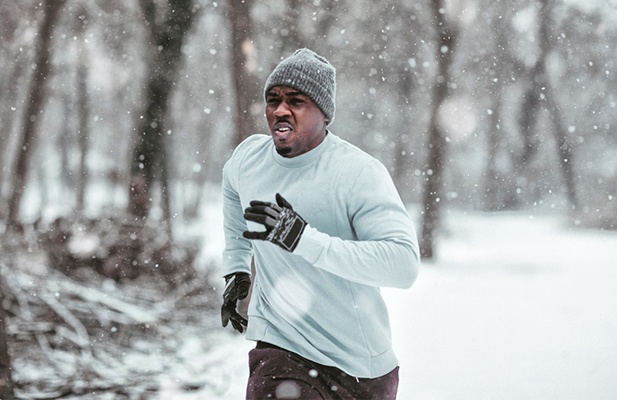
While cool weather can feel like a relief after a hot summer of training, running in cold weather isn't without risks. When temperatures get below freezing, runners need to take special care of their health to avoid illness and injuries.
The biggest health risks runners face in the cold are:
- The deep breaths associated with exercise can bring very cold air into the lungs. This may cause breathing problems, and also quickly lower the core body temperature. This effect is worse when the air is very cold and dry, or there is a strong cold wind blowing into a runner's nose and mouth.
- In extreme cold, the heart can begin to beat irregularly. Even when this irritability is slight enough to not carry serious health risks, it can be challenging for the body in that it impedes exercise and performance. In severe cases, heart rhythms can degenerate into ventricular fibrillation.
Here are some ways to protect yourself when running in cold weather:
Wear the right clothes for cold weather running
Layering clothing provides extra insulation and protection from cold. Synthetic fabrics offer additional protection from cold and heat loss through sweat; polypropylene is particularly good for staying dry and warm. Wear a base layer of silk or synthetics, then layer on insulating fleece, wool, or synthetics, and then a light wind-breaking outer layer.
Protect your face, head, and extremities
Covering your head retains needed body heat, and mittens preserve more heat than gloves. While you may use a scarf over your lower face, a balaclava is more effective. Covering your nose and mouth, and breathing through the nose, warms and moistens the air before it reaches your lungs, preventing breathing problems. And keeping your feet dry is critical in cold weather: wear synthetic socks, and be wary of running in slushy conditions, when the ground is both wet and cold.
Get warm and stay warm
Starting a training run with a cold body on a cold day impedes performance and may invite injury. It's best to do a light warmup inside, at home or at the gym, and take your run outside only when your body is ready. Note that “warm” doesn't mean “hot”: layering outdoor gear over workout clothes that are already sweaty from indoor exertion reduces the insulating value of your clothes and lowers your skin temperature too quickly.
Hydrate well
While you may not feel as thirsty in cold temperatures, hydration is just as important in winter as in summer. Winter air tends to be dry, and increased respiration releases valuable moisture into the air. Hydrate just as much as you do any other time of year, and for the same reasons. You may even want to consider integrating IV hydration therapy into your hydration and recovery strategies for maximum benefit.
Adapt your running style to the conditions
- Shorten your stride and be cautious in slippery road conditions. Ice, slush, snow, and rain can all contribute to a fall or an injury.
- If you can, run with the wind into your side. Cold wind in your face can hamper respiration, while wind at your back accelerates heat-spending sweat.
- In winter weather, use your outdoor runs to build overall fitness. Focus on time, not distance, and dial down the intensity of exertion.
- Running in loops keeps you from getting too far away from home or help in extreme weather, while running with a partner adds safety and support.
- Respect your limits. Cold temperatures restrict blood flow, which can cause muscles to tighten and cramp. Don't force yourself to the point of injury.
Know the signs of frostbite and hypothermia
Even in cold weather that doesn't seem extreme, runners are susceptible to frostbite and hypothermia.
Frostbite is skin damage caused by exposure to extreme cold temperatures and reduced circulation. It can happen even when wearing protective clothing. Initial signs are:
- Cold skin and a prickling feeling
- Numbness
- Skin turns red, white, shades of blue or grey
Caught soon enough, frost nip doesn't require medical treatment, and you just need to get warm. Run with a partner and periodically look at each other's noses and skin for unusual signs of change. Monitor your extremities for feelings of numbness or loss of sensation.
Hypothermia is a loss of function due to decreased core temperature. Hypothermia affects the brain and cognitive functions before affecting other organs. Early signs of hypothermia are:
- Apathy and reduced feelings of hunger, pain, or nausea
- Confusion, lethargy, and slurred speech
Because hypothermia affects the brain and thought processes, it is particularly dangerous when running alone. Having a training partner lowers the risk of severe, threatening hypothermia.
After your run, immediately put on warm, dry clothing and rehydrate. Try lukewarm water or tea to add needed fluids without further reducing your internal temperature. Take care of yourself when training in winter, so that you can push yourself harder in the spring.








